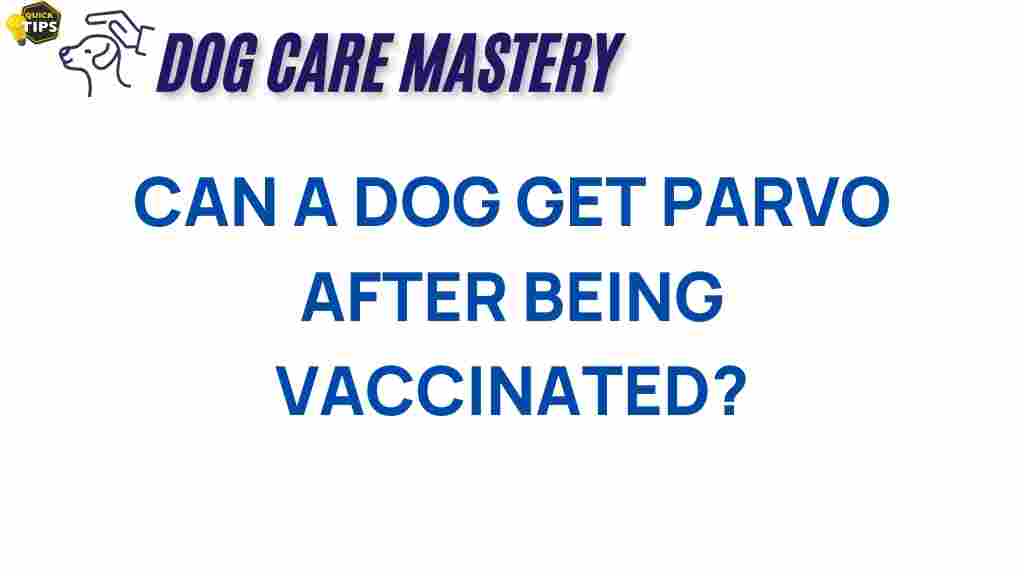Can a Vaccinated Dog Still Contract Parvo? Understanding Dog Parvo Risks
When it comes to the health and well-being of our furry friends, few topics spark as much concern among dog owners as dog parvo. This highly contagious viral infection can be devastating, particularly for puppies and unvaccinated dogs. With widespread vaccinations available, many pet owners wonder: can a vaccinated dog still contract parvo? In this article, we will unravel common myths surrounding dog parvo, explore the effectiveness of vaccines, and provide essential information on keeping your dog safe and healthy.
What is Dog Parvo?
Dog parvo, or canine parvovirus, is a highly contagious virus that primarily affects the gastrointestinal tract of dogs. It can lead to severe dehydration, vomiting, diarrhea, and, in the worst cases, death. The virus is particularly dangerous for puppies and unvaccinated dogs, but even healthy adult dogs can be at risk.
Understanding the Vaccine
The canine parvovirus vaccine is part of the core vaccination schedule for dogs. Vaccination helps to build immunity against the virus, significantly reducing the likelihood of contracting the disease. However, it’s essential to understand that no vaccine is 100% effective. Here’s a closer look at how the vaccine works:
- Initial Vaccination: Puppies typically receive their first parvo vaccine at 6 to 8 weeks of age, followed by additional doses every few weeks until they are about 16 weeks old.
- Booster Shots: Adult dogs require booster shots to maintain immunity, usually given every 1 to 3 years, depending on the veterinarian’s recommendation.
Can a Vaccinated Dog Still Contract Parvo?
Despite being vaccinated, a dog can still contract parvo, albeit the risks are significantly lower. Here are some scenarios where this may happen:
1. Incomplete Vaccination
If a dog does not complete the full vaccination series, their immunity may not be strong enough to protect them from dog parvo. Puppies are particularly vulnerable if vaccinations are not administered on schedule.
2. Immunocompromised Dogs
Some dogs may have weakened immune systems due to underlying health conditions, medications, or age. These dogs may not respond adequately to the vaccine, leaving them susceptible to infection.
3. Virus Exposure
Even vaccinated dogs can be exposed to a high viral load of parvovirus in the environment. In such cases, the vaccine may not provide sufficient protection, especially if the dog was recently vaccinated or if it’s a newer strain of the virus.
4. Vaccine Efficacy
While vaccines are generally effective, they do not guarantee complete immunity. Factors such as the dog’s health, the timing of vaccination, and the specific vaccine used can all play a role in its effectiveness.
5. New Strains of the Virus
Canine parvovirus can mutate, leading to new strains that may not be covered by existing vaccines. In rare cases, a vaccinated dog could be susceptible to these new strains.
Symptoms of Dog Parvo
<pRecognizing the symptoms of dog parvo early is crucial for effective treatment. Common symptoms include:
- Severe vomiting
- Bloody diarrhea
- Loss of appetite
- Lethargy
- Fever
- Dehydration
If you suspect your dog may have parvo, it’s essential to seek veterinary care immediately, as early intervention can save lives.
Prevention Tips for Dog Parvo
<pTaking preventative measures can help protect your dog from parvo, even if they are vaccinated. Here are some tips:
- Complete the Vaccination Schedule: Ensure your puppy receives all required vaccinations on time.
- Regular Booster Shots: Keep up with your dog’s booster vaccinations as recommended by your veterinarian.
- Avoid High-Risk Areas: Avoid taking your dog to places where many dogs congregate until they are fully vaccinated.
- Practice Good Hygiene: Wash your hands and disinfect surfaces if you have been around unvaccinated dogs or parvo-infected areas.
- Limit Contact with Infected Dogs: If you know of any dogs in your area that are infected, keep your vaccinated dog away from them.
Troubleshooting: What to Do If Your Dog Is Exposed to Parvo
If you believe your vaccinated dog has been exposed to dog parvo, consider the following steps:
1. Monitor for Symptoms
Keep a close eye on your dog for any signs of illness. Early detection is vital for effective treatment.
2. Consult Your Veterinarian
If your dog shows any symptoms or you suspect exposure, contact your veterinarian immediately. They may recommend diagnostic tests or preventive care.
3. Isolate Your Dog
To prevent potential spread, isolate your dog from other pets and avoid public areas until you receive guidance from your veterinarian.
4. Maintain Hygiene
Disinfect your home and yard, especially areas where your dog frequents. Use a bleach solution to kill the virus effectively.
Conclusion: Protecting Your Dog from Parvo
While a vaccinated dog has a significantly reduced risk of contracting dog parvo, it is not entirely immune. Understanding the vaccine’s limitations, recognizing the signs of parvo, and taking preventive measures are essential for keeping your dog safe. Regular veterinary check-ups, vaccinations, and responsible pet ownership are the best defenses against this dangerous virus.
For more information on dog parvo and vaccinations, consult your veterinarian or visit reputable sources like the American Kennel Club for updates and guidance.
By staying informed and proactive, you can help ensure your dog’s health and well-being, allowing them to lead a happy, active life free from the threat of dog parvo.
This article is in the category Health and created by dogcaremastery Team
